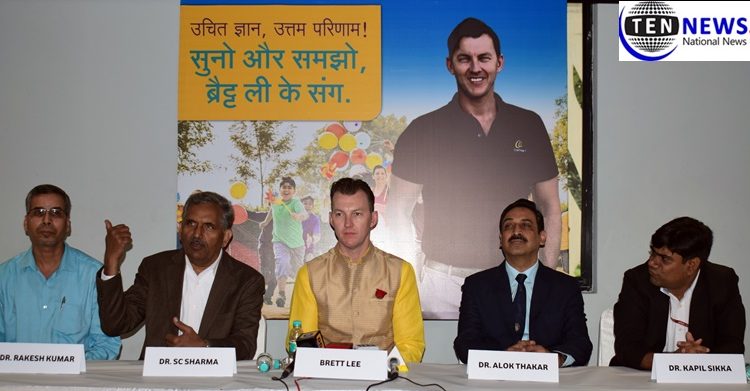

New Delhi (14/11/2019): At a Children’s Day celebration organised in association with the All India Institute of Medical Sciences (AIIMS) New Delhi, Cochlear’s Global Hearing Ambassador and international cricket legend Brett Lee urged parents and policymakers to focus greater attention to hearing health, especially among children.
His mission is to amplify and generate more conversations about making Universal Newborn Hearing Screening (UNHS) mandatory across all hospitals in the National Capital Region (NCR). Key experts and opinion leaders from Delhi – Prof. Dr. S.C. Sharma (ENT specialist, All India Institute of Medical Science) and Prof. Dr. Alok Thakar (ENT specialist, All India Institute of Medical Sciences) – joined Brett Lee to talk about the hearing health situation in Delhi.
Speaking to Ten News, Lee said, “Despite these huge numbers, awareness on the importance of hearing health is still very low. Over the last 5 years, I have been travelling across different states in India to increase this awareness of hearing loss, and the devastating effect it can have on a child’s future. UNHS should be made mandatory, like it is in other countries like the USA, Singapore, Australia and the UK.”
Prof. Dr. S.C. Sharma (ENT specialist, All India Institute of Medical Sciences) stressed on the need for early hearing screening by saying, “Hearing is one of those absolutely critical and thankfully, treatable human senses. It is disturbing to see a child born with hearing loss continuing their entire life that way. Like Brett says – No one deserves to live in silence, and I completely agree. Early detection and timely intervention will empower these young children to live their life to the fullest. However, if left untreated, it can not only affect communication and overall development, it can also lead to social isolation, anxiety and depression for their entire lives. But due to UNHS and early detection along with technological advancements and innovative medical devices like cochlear implants with consistent therapy and habilitation, we have been able to restore hearing, improve outcomes and combat this challenge. UNHS will add to our capacity to reduce the impact of deafness, and its future cost on society.”
Research says that there are 5-6 infants every 1,000 neonates in India who face hearing problems. “From what I have read, they will not be identified till they attain 2 or more years of age, by which time serious damage could have been done,” Lee added. “Universal screening for hearing of new-borns is the only way to decrease the burden of deafness globally, and in our societies.”
Prof. Dr. Alok Thakar (ENT specialist, All India Institute of Medical Sciences) endorsed that point with greater emphasis. “There is evidence that if intervention and support is provided along with early diagnosis before the baby is six months old, the child’s language development gets better. This also improves the child’s learning ability. As healthcare professionals, it is our responsibility to collectively work towards ensuring that every child in our state has access to hearing and continued support, so that they become successful and productive citizens. That is our vision too.”
Kerala has been outstanding in its endeavours in pushing for universal new-born hearing screening for children across 61 government maternity centres, and Dr. Sharma believes that Delhi can follow suit. Currently, Kerala is the only state to have successfully achieved 98 % UNHS across all government hospitals. The Kerala Social Security Mission has developed a software program to collect real time data of new-borns who have undergone screening. This data is archived and used by institutions like District Early Intervention Centres (DEICs) and medical colleges, during regular follow-ups. It enables them to provide advanced services to affected children and their families.
